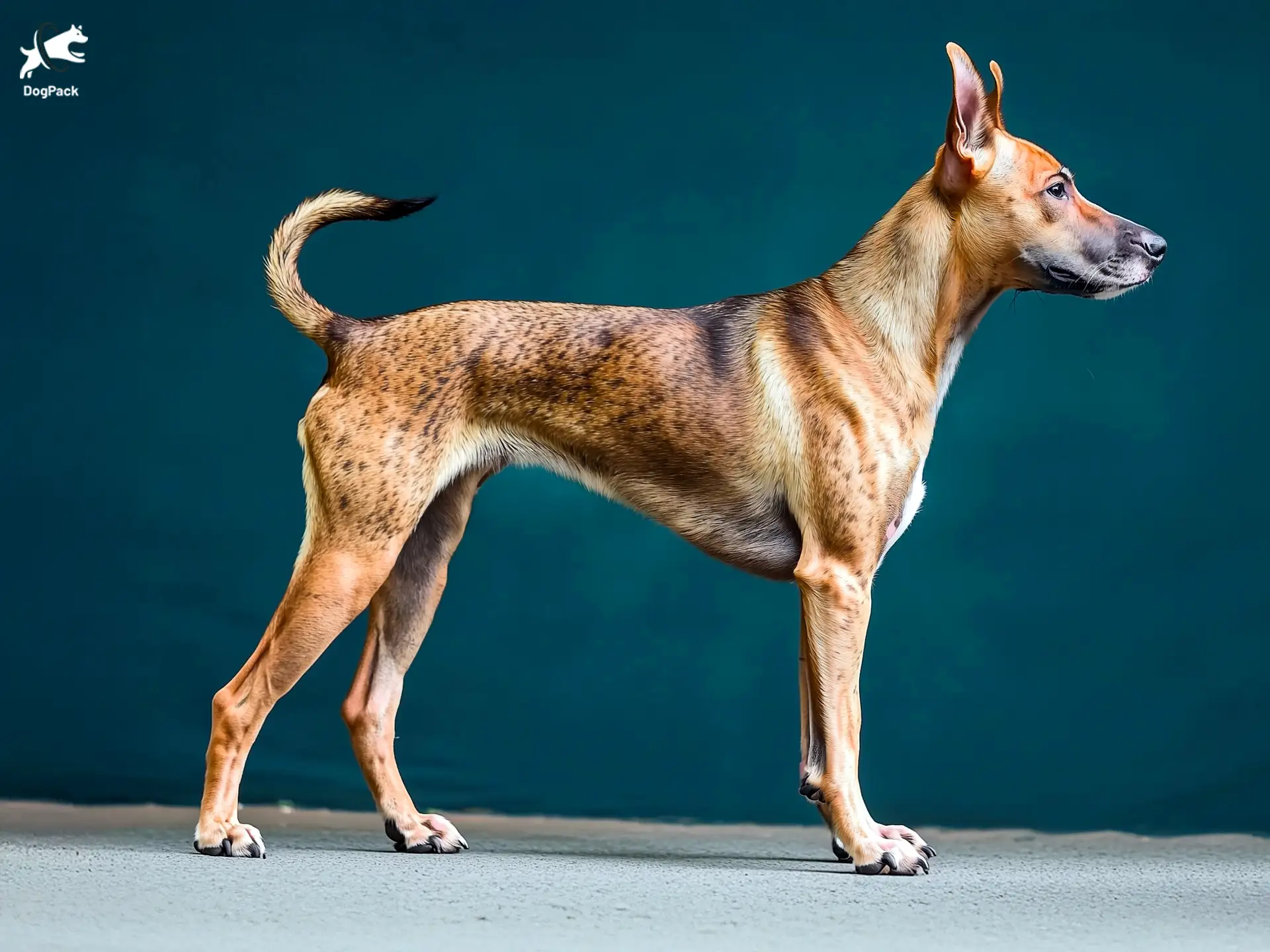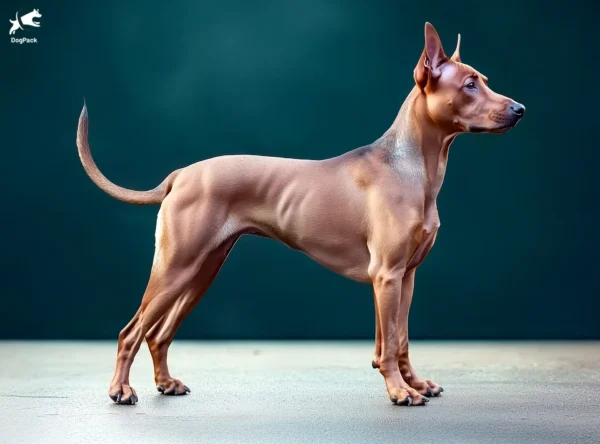Phu Quoc Ridgeback Dog Breed Info & Overview
The Phu Quoc Ridgeback, a treasured breed from Vietnam, is celebrated for its unique ridge of hair running along its back. Known for exceptional agility, sharp intelligence, and unwavering loyalty, this athletic dog thrives with active owners who appreciate its adventurous spirit. Whether as a devoted companion or an agile partner, the Phu Quoc Ridgeback stands out as a truly remarkable breed.
Characteristics
Pictures
Breed History
This unique breed hails from Phu Quoc Island in Vietnam, where early fishing and hunting communities prized its agility and keen senses. Legend has it that these island dogs navigated dense forests and shoreline with equal finesse. Many locals believed they possessed near-mythical abilities, making them popular for tasks like guarding boats and tracking small game.
Over centuries, selective breeding shaped their resilience and loyalty, traits that endeared them to travelers and explorers. These dogs adapted to diverse environments, from sandy beaches to mountainous terrain. While they remained relatively obscure beyond Vietnam’s borders, occasional sightings fueled intrigue among tourists, who often marveled at the characteristic ridge running opposite to the coat’s normal growth pattern.
Today, modern enthusiasts cherish them for their connection to a rich cultural heritage. The Phu Quoc Ridgeback has gained increased recognition in local dog shows, spotlighting its athletic physique and striking appearance. Though still considered rare globally, devoted advocates celebrate the breed’s proud lineage and aim to preserve its distinctive traits through responsible breeding programs and international awareness efforts.
Temperament, Personality
Confident and spirited, these dogs form tight bonds with their families, often seeking out companionship at every opportunity. Their intelligence and keen observation skills mean they quickly pick up on household routines. Those who spend plenty of time engaging them mentally and physically often witness a well-mannered companion, able to transition seamlessly from guard dog mode to friendly playmate.
With children, they tend to be gentle yet energetic, thriving in environments where they can run and explore. Proper socialization from puppyhood encourages them to remain open-minded around newcomers. Though they’re typically reserved with strangers, consistent positive interactions help curb any wariness. Households with other pets usually fare well if introductions are handled calmly and patiently.
At times, this breed may appear aloof, quietly assessing a situation before deciding how to respond. Such measured caution can be an asset in unpredictable settings. A Phu Quoc Ridgeback that’s supported with reassurance and guidance grows into a confident, attentive dog. Ultimately, owners who nurture trust and cooperation will be rewarded with steadfast loyalty and unwavering affection.
Physical Characteristics
Standing on well-muscled limbs, these dogs showcase a lean yet powerful build that allows for swift movement. Their short coat helps them cope with Vietnam’s tropical climate, providing a sleek appearance with minimal grooming requirements. Most notably, a distinctive ridge of fur along the spine grows in the opposite direction of the rest of the coat, creating a striking visual feature.
Eye color typically ranges from warm brown to a lighter hazel, while coat colors can vary from sandy to black or brindle. In some cases, subtle patterns highlight the ridgeline even further. The ears are medium-sized and set high, giving an alert expression that aligns perfectly with the breed’s poised posture and watchful aura.
Because they often weigh between 50 and 75 pounds, regular exercise is key to keeping them lean and fit. A mature adult retains a balanced silhouette—never appearing bulky or too slender. The Phu Quoc Ridgeback typically exudes grace and athleticism, reflecting its heritage of island survival where speed, agility, and adaptability were essential for daily life.
Health Issues
Although relatively robust thanks to natural selection, these dogs can still experience common canine ailments. Hip dysplasia sometimes appears in older dogs or those with poor nutrition during developmental years. Regular joint check-ups are advisable, along with consistent weight management to reduce stress on their hips. Digestive sensitivities may also occur, so high-quality, easily digestible meals can help maintain overall health.
Additionally, because their coat is short, they may be slightly more susceptible to skin irritations if exposed to harsh environmental conditions. Routine examinations for parasites or sores are vital, especially for dogs that enjoy outdoor adventures. Staying attentive to early warning signs such as persistent scratching or redness ensures timely treatment, helping to preserve their glossy coat and comfortable wellbeing.
Though rare, certain genetic eye disorders have been documented, making regular check-ups with a veterinary ophthalmologist beneficial. Early detection allows for proactive care and can prevent complications down the road. With proper diet, exercise, and routine vet visits, the Phu Quoc Ridgeback often lives a healthy life, reflecting its strong lineage and natural resilience.
Grooming Needs
A brisk brushing session once or twice a week typically keeps the coat in tip-top shape, removing dead hairs and stimulating skin health. Because the fur is short, shedding is usually manageable and doesn’t require extensive effort. Most owners find a simple rubber curry brush or soft bristle brush sufficient for routine grooming, leaving the dog’s coat looking shiny and neat.
Bathing can be done on an as-needed basis, especially after muddy outings or saltwater swims. When you do wash them, opt for mild shampoos that won’t irritate their skin. Routine ear checks are a must, too, as moisture buildup can lead to infections. Keep nails trimmed regularly, and remember to brush those teeth for optimal oral health.
Professional grooming isn’t strictly necessary unless you prefer a thorough pampering session. However, some owners occasionally book a professional groomer to handle nail clipping or to ensure a pristine finish for show competitions. The Phu Quoc Ridgeback’s low-maintenance coat serves as a bonus for busy individuals who appreciate a tidy-looking companion without hours of grooming labor.
Exercise Requirements
Given their island heritage, these dogs have an inherent love for exploration and outdoor activity. Expect them to thrive on long walks, hikes, or even supervised swimming sessions. Games of fetch or agility drills tap into their natural athleticism. In fact, daily exercise helps channel their energy in positive ways, reducing the likelihood of boredom-induced mischief at home.
Aim for at least one to two hours of activity per day, which can be broken into shorter sessions for busy households. Mental stimulation is equally critical, so puzzle toys or scent-based games keep them sharp. Owners who neglect their exercise needs may find them becoming restless or prone to digging and other undesirable behaviors.
Off-leash play in a securely fenced area is a great way for them to burn off steam, as these agile athletes excel in sprinting and quick directional changes. Even older individuals appreciate gentle walks or slower-paced outings. The Phu Quoc Ridgeback benefits tremendously from varied, engaging workouts that provide both physical exertion and mental enrichment.
Training Tips
Eager yet independent, these canines respond best to positive reinforcement techniques. Harsh methods or heavy-handed approaches might undermine trust, leading to stubborn or timid behavior. Instead, reward them with treats, praise, or play sessions whenever they display desired actions. Short, upbeat training intervals keep them focused, especially if you incorporate tasks that appeal to their problem-solving nature.
Consistency is key. If a command is taught, ensure everyone in the household uses the same cue and upholds the same rules. This uniformity prevents confusion and speeds up learning. Incorporating fun challenges, like hide-and-seek with toys, can further build confidence. By turning training into a collaborative game, you nurture a well-mannered companion who genuinely enjoys interacting with you.
Some dogs may be sensitive to sudden noises or chaotic environments, so gradual socialization is essential. Introduce them to various people, pets, and settings during puppyhood to encourage adaptability. Over time, a Phu Quoc Ridgeback will learn to calmly assess new experiences. When guided with patience and positivity, they often develop into highly obedient and reliable partners.
Nutrition, Diet
Phu Quoc dogs have a high activity level, so fueling them with nutrient-dense meals is critical. Adult Ridgebacks usually do well on a balanced formula that includes around 25% protein from quality meat sources like fish or poultry. Split their daily ration into two meals to aid digestion. Typically, an active 60-pound individual may require about 1,200–1,400 calories per day, adjusting slightly for age and exercise intensity.
For puppies, growth spurts demand more frequent meals—three to four feedings daily—featuring easily digestible proteins for muscle development. Calcium and phosphorus ratios should be monitored closely to support healthy bone growth, especially for those who will reach the higher end of the weight range. Avoid excessive treats or table scraps, as this breed can pack on pounds if overindulged.
Adults benefit from complex carbohydrates such as sweet potatoes or brown rice, coupled with omega-3-rich ingredients like salmon oil for skin and coat health. Occasional fresh fruits, including apples or bananas, provide vitamins without too many extra calories. When in doubt, consult a canine nutritionist experienced with Phu Quoc Ridgeback needs to fine-tune a meal plan that sustains their robust energy.
Adoption, Breeders
Locating a reliable source for this breed can be challenging, given its scarcity outside Vietnam. Start by contacting the Vietnam Kennel Association for information on reputable breeders or upcoming events. Genuine breeders prioritize health screenings and proper lineage documentation, ensuring you receive a well-socialized puppy. Patience is key, as waiting lists can be lengthy.
If you’re considering adoption, try connecting with specialized rescue groups that focus on lesser-known Asian breeds. Occasionally, retired show dogs or rehomed adults become available through local clubs or online platforms like Vietnam Animal Aid. While still rare, these adoption avenues can offer a second chance to a deserving companion, plus the rewarding experience of rescuing a unique canine.
Whether purchasing from a breeder or adopting, always inquire about the dog’s medical history and ask for references. Visiting the premises in person—if feasible—allows you to witness living conditions firsthand. A Phu Quoc Ridgeback often bonds deeply with its family, so ensuring a trustworthy background sets the stage for a fulfilling, lifelong partnership that honors this breed’s proud heritage.
Family Pet?
These dogs typically integrate well into family life, provided they receive ample exercise and a structured routine. Their protective instincts can be an asset around children, as they often watch over little ones with quiet attentiveness. However, supervision is vital to guide respectful interactions on both sides, ensuring each family member understands boundaries and fosters mutual trust.
Because of their high energy, older kids and teens who enjoy outdoor adventures may find an enthusiastic companion in this breed. They thrive on shared activities like biking or trail running, reinforcing a bond rooted in fun. Younger children can still benefit from the dog’s affection, but gentle guidance from adults is essential to prevent unintentional rough play.
It’s worth noting that small pets such as cats or rabbits might trigger a chase response, so early socialization is crucial if you want a harmonious multi-pet household. Ultimately, a Phu Quoc Ridgeback can be an extraordinary addition, bringing loyalty and excitement to daily life. Just remember to meet their mental and physical needs consistently for a happy, balanced environment.
Right For You?
If you value an active lifestyle and appreciate a curious, intelligent companion, this breed may pique your interest. They thrive when given tasks or challenges, so individuals who enjoy hiking, running, or even dog sports will likely find a perfect match. On the other hand, a couch-potato home might frustrate them, leading to restlessness or destructive habits.
Apartment living can be manageable only if owners commit to daily exercise and mental stimulation. A secure backyard is preferable, offering space to roam and sniff. Those allergic to dog hair should note that shedding is moderate, though easy to manage with regular brushing. Anyone willing to invest time and effort in training will be rewarded with a loyal companion.
Ultimately, prospective owners should research thoroughly and weigh their ability to meet a Phu Quoc Ridgeback’s active, attentive nature. Consistency, patience, and mutual respect form the backbone of a rewarding relationship. If you’re excited about embracing their unique heritage and energetic spirit, you’ll be well on your way to forging a lasting bond with an exceptional canine friend.
Conclusion
This distinctive Vietnamese dog, with its iconic ridge and agile physique, stands out among canine enthusiasts seeking something truly rare. It craves both mental and physical engagement, making it a top contender for outdoorsy families or individuals. Despite being lesser-known globally, its loyal disposition and rich heritage are earning more admirers. Providing consistent exercise, structured training, and early socialization will nurture a confident, well-adjusted companion.
Whether you’re intrigued by its striking appearance or drawn to its versatile abilities, the Phu Quoc Ridgeback can reward dedicated owners with unwavering devotion and vibrant energy. Take the time to research properly, and you might discover the perfect match for your adventurous spirit in this extraordinary breed.
FAQs
-
How does the Phu Quoc Ridgeback’s ridge form?
The distinctive ridge on the Phu Quoc Ridgeback’s back is formed by hair growing in the opposite direction of the rest of their coat. This unique feature is hereditary and is shared by only a few breeds worldwide.
-
Are Phu Quoc Ridgebacks naturally good swimmers?
Yes, the Phu Quoc Ridgeback is an excellent swimmer. Their webbed feet, unique to the breed, make them highly adept in water. Historically, this skill was used for hunting and navigating the islands of Vietnam.
-
How independent are Phu Quoc Ridgebacks?
Phu Quoc Ridgebacks are highly independent and can make decisions on their own, a trait developed from their origins as free-roaming hunters. While they bond deeply with their family, they require experienced handlers to guide their instincts effectively.
-
Are Phu Quoc Ridgebacks suitable for city living?
While adaptable, Phu Quoc Ridgebacks thrive in environments with space to roam. They are best suited to homes with secure yards or access to open areas where they can exercise their natural agility and energy.
-
How rare is the Phu Quoc Ridgeback outside Vietnam?
The Phu Quoc Ridgeback is one of the rarest dog breeds globally, with most of the population still found on Vietnam’s Phu Quoc Island. Their limited distribution makes them highly sought after but less common in international households.
Breed Ratings
Smart and inquisitive, they learn quickly with consistent training but can show a touch of independence if not properly engaged.
Enthusiastic about interactive games and outdoor fun, yet gentle when bonding with family members of varying ages and energy levels.
Thrives on daily physical challenges like hikes and fetch, making them an ideal choice for active, adventure-loving households.
Short coat is relatively low-shedding, though some seasonal shedding may occur. Weekly brushing helps minimize loose hair around the home.
Moderate prey instincts may surface around small animals. Early socialization and training reduce the likelihood of unplanned chasing.
Minimal coat care needed; quick brushing and occasional baths keep them looking neat without frequent trips to professional groomers.
Eager to learn but occasionally headstrong, they excel when trained with positive reinforcement and clear, consistent guidance.
They can handle short periods solo, but extended isolation leads to boredom. Engage them with toys or activities to prevent restlessness.
Protective instincts prompt alert barking, though they’re generally not overly vocal. Proper training keeps this behavior in check.
Rarely drools, keeping them comfortable companions for those who prefer a tidy household and minimal slobber around the furniture.
Usually sociable with well-introduced dogs, though some may show cautiousness. Early, positive interactions foster better canine friendships.
Hardy genetics contribute to overall wellness. With proper vet care, diet, and exercise, they typically enjoy a long, vibrant life.













